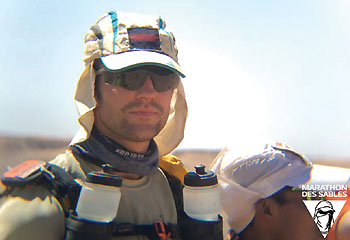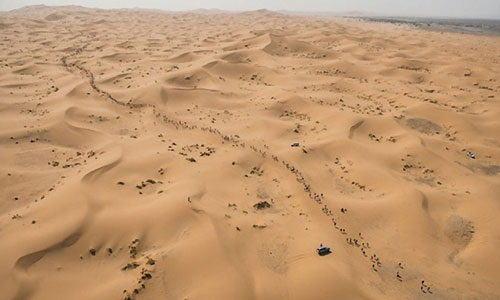|
MARATHON DES SABLES
by Captain A J P Stonor
Grenadier Guards
|
It is hot and my breathing is irregular as the temperature reaches 35 degrees. The sun is rising ever higher and there is still 30km to cover and the next checkpoint is 14km away. It all seems too much and I find myself saying ‘Keep it steady, respite will come’ as we run up and down the sand dunes as part of the Marathon des Sables (MdS) in Morocco. Before long, the checkpoint appears and a 1.5L water bottle is offered and indeed respite follows a few hours later at the finish line, bringing the day to an end. The six days, ranging from 34 to 82km per day, were hard work. Each day I would finish exhausted and wondered how I could maintain the effort. But the next day would come, and somehow the energy would be found to meet the challenge. Of all the hurdles I faced, the greatest was the mind. In moments of hardship, questions of doubt, uncertainty, not to mention the exhaustion, overwhelms the desire to continue. But fortunately, the responsibility to friends in the race, supporters back home and curiosity helped overcome the difficulty.
 The author
The author |
In 1984 Patrick Bauer, a Frenchman, visited the independent state of Morocco to run in the desert. At the time, this initiative was odd given that marathon running was not popular as it is today, especially in faraway lands. Nevertheless, with his brother driving a jeep filled with bottled water, Patrick ran 350km over a week. An extraordinary achievement which two years later was redone by eight other enthusiasts and the event, MdS, was born. The MdS 2016 was dramatically different to that of Patrick’s run. Over 1100 participants showed up to the start line, the event was publicised live across the world and the logistical support was enormous, with 700 staff members (mostly French). Very different events, but what does endure since Patrick’s first run is that the runner’s experience in the Sahara desert remains romantic and beautiful. He has banned mobile phones, demanded every runner to carry all equipment from food to sleeping bags and asked runners to value their desolate surroundings and friendships they create. He does not see the Ultra Marathon as a race but an extraordinary moment in time to be shared by all. (Interestingly, the event is held in the vicinity of the Algerian border, to perhaps support the Moroccan’s Sahara border claim).
Having spent most my training in the rolling green hills of Wales, the Sahara desert is unsurprisingly the polar opposite environment. The colours of scorched dark brown plains overshadowed by fluorescent orange dunes were spectacular. The going from hard stony paths to slippery sandy slopes formed an environment that was difficult to conquer. And while life is presumed non-existent in the Sahara, close observation would reveal the crevice loving scarab beetle, the sandy coloured fringe fingered lizard, and the calm black arabian camels. Some of our runs would even take us through desolate earth cob villages that blended into their surroundings. Inhabitants would emerge and clap us onwards (though I am sure they thought that we runners were strange for exerting huge energy in peak day heat). But it was the scarcity of water that astonished me. Water is everything in the desert and it is no wonder that the old tribes of North Africa and Arabia would guard their water wells so tenaciously. Fortunately, the MdS crew ensured we were never thirsty.
Conditions of heat, terrain, lack of food and mental torment made for a challenging week. But such difficulties were particular to the individual. Some people found that their feet would disintegrate into bulbous blisters, others found that training on cold tarmac to competing on sandy dunes was inordinately tedious, while others found the heat sapping of energy. But in these moments of hardship where reprieve was momentary, motivation and reason had to be found to keep going through another day’s sweat. And indeed, the core training values that exist in the Armed Forces helped articulate and channel my thoughts and actions. Whether it was the routine of the day, supporting each other when sick, ensuring everyone got to the start line, or encouraging others for the next day, these core values helped overcome the day’s challenge. Everyone endured bad days, and everyone had moments of sheer unpleasantness. Nevertheless, it is the competitors next to you, the supporting staff’s attention, the doctor’s blister piercing knives, that created an environment where people could reach a goal beyond their expectations. It is these values, orientated towards the other competitors, that instigate the foundations of the team and help overcome subsequent challenges.
The MdS is a remarkable event that brings people from across the world to compete in the Sahara desert. A beautiful stretch of dunes, mountains and flats are your home for that week. It is a tough race. But it does offer a unique and surmountable challenge. In those moments, it is the people next to you who will offer that encouraging hand, an energy bar, and the kind words or banter that help get you to the finishing line. It is an exceptional experience and I urge anyone a little curious to sign up and take part in this event.
 The 1100 competitors making their way across the dunes
The 1100 competitors making their way across the dunes |
|
|


